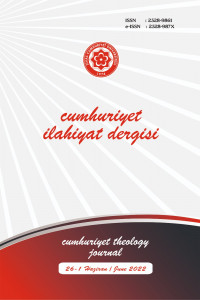Ücret İle Tazminat Sorumluluğu Birlikteliği
Collaboration of Liability for Usage Benefit and Compensation
Author(s): Abdurrahman AkmanSubject(s): Law, Constitution, Jurisprudence, Sociology, Islam studies, Sociology of Law, Sharia Law
Published by: Cumhuriyet Üniversitesi İlahyat Fakültesi
Keywords: Islamic Law; Med̲jelle; Benefit; Liability; Compensation;
Summary/Abstract: The aim of the article is to reveal the nature and importance of wage and compensation in legal responsibility and to discuss the possibility of these two basic tools together in the light of different views of the mad̲h̲habs. In addition, the article deals with the functions of these two basic concepts within the scope of Islamic responsibility law. There are two main sources of compensation liability in Islamic Law of Obligations. These are; breach of contract and act of injustice. Harming someone else is prohibited by any of these means. In cases where people cause harm to others in social life, the legal order tries to compensate for the damage in question. It is not a legal way to harm the other party for the remedy of the damage. The method of remedying the damage and what kind of economic values it will cover have been the subject of discussion in the doctrine. Are there other obligations at the same time as the liability for compensation? In this regard, Article 86 of Med̲jelle ̲ -yi Aḥkām-i ̊ʿAdliyye regulates that compensation liability and wage cannot go together in accordance with the Ḥanafī mad̲h̲hab. It is important to deal with the scope and exceptions of this rule and the transformation it has undergone in the history of Islamic law with a comparative method and to establish its connection with the present. The rule that wages and indemnity liability cannot go together finds more application in contracts where the performance of one of the parties is a rent wage. Goods and service contracts come to the fore within the scope of contracts requiring this. Such contracts are generally considered within the scope of rent contracts. The obligations of the parties in those contracts are to leave the use of a commodity to the other party of the contract and that party undertakes to pay a certain usage fee accordingly. Both parties have mutual debts and obligations. A house, an animal, an item may be rented. In labor rent called service contracts, the worker (ecīr) and the employer agree on the work to be done. In case the source of the liability is different, for example when there is a difference in the reason and subject, liabilities can be combined to some extent. In the Ḥanafī school, the point of view of usage benefit lies on the basis of the incompatibility of wage and compensation responsibility. There are some theoretical reasons for this in the Ḥanafī mad̲h̲hab. There is a general agreement on compensation for contractual or tortious damages. In order for a damaged property to be subject to compensation, it must be a property that has legal value and tangible assets. Damage to property can be defined as a decrease or deterioration in the value of something. Anyone who claims to have suffered damage should base their claim for compensation on these grounds. What is meant by compensation is to eliminate the actual damage suffered. Equivalence is one of the issues underlined in compensation for damage. One of the most basic principles of Islamic compensation law is to return to the situation before the damage occurred, as much as possible. The main thing in remedies is not punishment, but compensation for the damage suffered. The basis of the breach of debt is the non-payment or late payment of the debt or defective performance. In case of existence of such situations that prevent the performance of the debt, the actual damage must be compensated. Therefore, claims for loss of profits are not included in the compensation. As for the compensation for the damage arising from the tortious act, while Med̲jelle did not seek ̲ intent in the compensation of the damage to acting directly, it observed the existence of this in case of causing damage (arts. 92 and 93). In legal liability, it is aimed to compensate the fungible (mis̱lī) or nonfungible (ḳıyemī) of the thing damaged due to tortious act. Compensation with fungible is the type to be preferred with priority in remedying the damage. However, the issue of whether usage benefits (menāfiʿ) are also eligible for compensation is controverted issue among Islamic jurists. The Ḥanafī school believes that the benefits don’t comply with these conditions. But, other mad̲h̲habs have opposing views to the The Ḥanafī sect on this issue. Others have accepted the benefit of the usurped property as legal property and have approached positively to the subject of compensation. The basis of this difference lies in whether usage benefit is legally accepted as property. However, in the later periods, some exceptions were made to the first view within the Ḥanafī school. These are; foundation and orphan and commercial properties. It is accepted that loss of benefit in these matters is subject to compensation. In addition, in the Med̲jelle amendments, benefits are accepted as property ̲ that has legal value, and it has been accepted that loss of benefit in cases of tortious act and breach of contract may be the subject of compensation in accordance with fairness in our opinion.
Journal: Cumhuriyet İlahiyat Dergisi
- Issue Year: 26/2022
- Issue No: 1
- Page Range: 45-63
- Page Count: 19
- Language: Turkish

